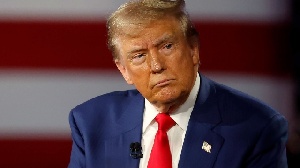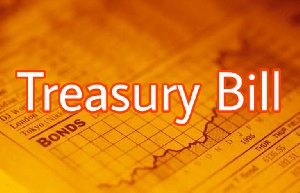- Home - News
- Elections 2024
- News Archive
- Crime & Punishment
- Politics
- Regional
- Editorial
- Health
- Ghanaians Abroad
- Tabloid
- Africa
- Religion
- Photo Archives
- Press Release
General News of Friday, 4 April 2025
Source: www.ghanawebbers.com
Trump announces sweeping tariffs on all countries; Ghana affected by 10% tax
U.S. President Donald Trump has announced significant tariffs. These include a 34% tax on Chinese imports and a 20% tax on European Union goods. This move marks a sharp increase in global trade tensions.
Speaking from the Rose Garden, Trump declared a national economic emergency. He justified the tariffs as a way to boost domestic manufacturing. He claimed that the U.S. has faced decades of economic exploitation.
"Our country has been looted, pillaged, raped, and plundered," he said. "Taxpayers have been ripped off for more than 50 years." He vowed that this would not continue.
The new tariffs were imposed without congressional approval under the 1977 International Emergency Powers Act. They target many nations with large trade surpluses with the U.S. A baseline import tax of 10% will also apply across the board.
These measures have already caused a sell-off in U.S. stock markets. Investors are worried about an economic slowdown due to higher prices on housing, cars, and clothing. Economists warn these tariffs could lead to a global recession.
Olu Sonola from Fitch Ratings noted that average U.S. tariff rates will rise significantly by 2024. "Many countries will likely end up in a recession," he warned.
Critics compare this move to the Smoot-Hawley Tariff Act of 1930. That act worsened the Great Depression by starting a global trade war. Scott Lincicome and Colin Grabow from the Cato Institute cautioned against similar consequences today.
With these tariffs, U.S. rates will approach levels not seen since Smoot-Hawley, they stated.
Trump's tariffs will impact key trading partners worldwide but exclude Canada and Mexico under USMCA agreements. China faces additional penalties due to its role in fentanyl production, adding to its tariff burden.
The European Union and other affected nations are expected to retaliate with their own tariffs. Despite this potential backlash, Trump insists these measures will generate revenue and restore fairness in trade.
The White House shows no signs of reconsidering its strategy despite warnings from Republican lawmakers representing farm and border states.











